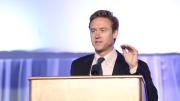Despite the protests that followed his selection as this year’s Graduate School of Education (GSE) Convocation speaker, Michael Johnston, M.Ed. ’00, received a warm welcome from the audience assembled on Wednesday afternoon in Radcliffe Yard. The Colorado state senator, education entrepreneur, and former teacher spoke about the right to know, the power to decide, and the will to love as the fundamental values of the “human business” of education.
Underscoring the importance of the “kids themselves” in education, Johnston told the powerful stories of three children whom he taught and mentored and who inspired his values as a policymaker in the education sector. He also invited the 644 graduating students to turn “a world of compliance into a world of creation” by returning to students, parents, and educators the power to make informed decisions.
As an education entrepreneur, Johnston founded the Mapleton Expeditionary School of the Arts, a redesigned urban high school in Thornton, Colorado, that became the first public high school in the state to see 100 percent of its graduating class admitted to college. Before becoming a state senator in 2009, Johnston served as Barack Obama’s education adviser during the 2008 campaign and transition to presidency. Soon after taking state office, he championed the Great Teachers and Leaders Law, or SB 10-191, which prescribes that teacher evaluations be based on student growth. “There isn’t much that Mike hasn’t seen or done in education,” said GSE dean James Ryan in introducing him.
Earlier this month, following the announcement of Johnston’s selection as speaker, a group of GSE students, alumni, and a pair of emeritus faculty members protested the school’s choice. They asked the administration to rescind the invitation, to make the speaker selection process more transparent and inclusive, and to create public venues where Johnston’s vision of education reform could be discussed and criticized. Their online statement of protest, which 150 GSE affiliates have endorsed, denounces his promotion of policies “where teachers are churned in and out of the profession based primarily on test score production.” The statement also asserts that SB 10-191, the Colorado law Johnston helped spearhead in 2010, weakens “teachers’ due process protections” and “makes it more likely that many if not most teachers and school leaders will be hyper-focused on test score production via low-level, standardized teaching.”
Responding to the protests in an open letter, Ryan confirmed that Johnston would be this year’s speaker, writing that “it is precisely because there is debate about his positions that [the school] should welcome the opportunity to hear from him.” The dean added that the senator has dedicated “his career to improving education and has demonstrated a strong commitment to increasing opportunities and improving outcomes for all students.”
In opening his first GSE convocation, Ryan apologized for any forthcoming missteps, confessing that he had practiced the speech in front of his children. A lawyer and a former professor at University of Virginia, he took office last September, succeeding Kathleen McCartney as dean. After the opening remarks, Christopher Brooks, a master’s degree candidate in higher education and chair of the class gift, announced that the class of 2014 had raised more than $15,000 for financial aid for next year’s class (a slight decrease from last year’s gift). Ryan then recognized the recipients of the Intellectual Contribution/Faculty Tribute Awards, which are presented to the top student in each of the school’s 13 master’s programs; the Commencement Marshals for the master’s programs and the school’s certificate and doctoral programs; Vanessa Beary, the doctoral candidate who won this year’s Phyllis Strimling Award; and associate professor of education Jal Mehta, winner of the Morningstar Family Teaching Award. GSE Alumni Council chair Christine Pina presented Magdalene Lampert, Ed.D. ’81, with the Alumni Council Award for outstanding contribution to education.
In her student address, Krista Sergi, a master’s degree candidate in prevention science and practice, underscored the importance of challenging the “single story” and of seeking the truth of the “whole story.” A degree in education, she said, “is a key to opening up voices that have been locked away and doors of opportunity that have been unjustly closed.”
GSE senior lecturer Karen Mapp, this year’s student choice as faculty speaker, referred to the fundamental role that her parents’ “hopes and dreams” had played in her own academic success. Mapp, who as a junior high school student was briefly placed in a “special-needs classroom” because of her skin color, encouraged the graduating students to “stand up to injustice in whatever form it may take.”









